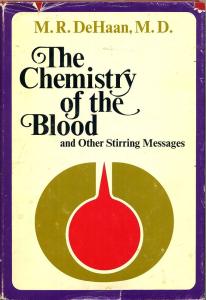What Does “The Blood of Jesus” Mean?
Recently there has been some public criticism of Christian “talk” about “the blood,” the “blood of Jesus,” especially. Of course, there’s nothing new about that. Even many Christians shy away, or more, from talking or singing about the blood of Jesus. Famous and influential Protestant preacher Harry Emerson Fosdick spoke about “slaughterhouse religion” and rejected talk about “the blood.” More recently, a leading and influential Womanist theologian has declared that we don’t need such language. But what does such language mean in traditional, evangelical Christian theology and worship?
When I was a kid, growing up in the thick of evangelical Christianity, I often heard sermons about the blood of Jesus. And, in church, we sang songs about the blood of Jesus. There are many such songs. “There’s Power in the Blood,” “Are You Washed in the Blood,” etc. Anyone who grew up in conservative evangelicalism knows about this theme of the blood of Jesus. I could go on and on helping those of you who aren’t familiar with this older evangelical them, but you’ll just have to take my word for it. As rare as it is today, talk of the blood of Jesus was not only common but pretty much necessary in the older evangelical churches.
So what does it mean? Is there a “Chemistry of the Blood” (title of a book by a well-known conservative preacher)?
All I can say is that, as an evangelical theologian, what the “blood of Jesus” means to me. And I suspect all evangelical (and other) theologians would agree with me. I suspect many evangelicals (and others) “in the pews” have meant something different. But, as always, I insist on a distinction, often even a stark difference, between theology and folk religion. Rarely does theology filter down into folk religion and folk religion is, in many Christian traditions, more prominent, empirically, than theology.
To me, “the blood of Jesus” is not a magic mantra. And the blood of Jesus is not his actual blood. Speech about the blood of Jesus in evangelical worship is meant to be a reference to his saving death on the cross. In other words, it’s a metaphor. It’s a metonymy. There is nothing magical about the actual blood of Jesus. Examined under a microscope, it would be ordinary human blood. And there is nothing special about “the chemistry of the blood” (of Jesus).
So why the language about the blood of Jesus in traditional evangelical worship, devotion, and singing? Simply because it’s biblical. It’s part of the “language of Zion,” a reference to biblically-based, traditional Christian language that is thick and not thin. Unfortunately, I believe, much contemporary Christian, even evangelical, language is thin, shallow, common.
Outsiders especially cannot understand all of the language of Zion. Learning the language of Zion was part of the training we received in church. Learning to understand it was supposed to be part of the education we received in Sunday School, Christian college, seminary. I was fortunate enough to receive that. I know many evangelicals did not and struggle with a kind of mental literalism or sheer confusion that is supposed to be dispelled by good evangelical education in church and school.
And that is part of the reason for this blog. To educate evangelicals about the true meanings of evangelical language. To elevate evangelical thought from folk religion to examined faith. I sometimes think the task is too much. The vast majority of evangelical Christians are mired in folk religion, at least to some extent. And that is not unique to evangelicals, of course. But evangelicals have their own, distinctive, if not unique, form of folk religion. And people mired in folk religion are often especially resistant to being told what their own faith tradition means, as opposed to what they think it means.
*Note: If you choose to comment, make sure your comment is relatively brief (no more than 100 words), on topic (don’t go off on tangents!), addressed to me, civil and respectful, not hostile or argumentative, and devoid of pictures or links.*














